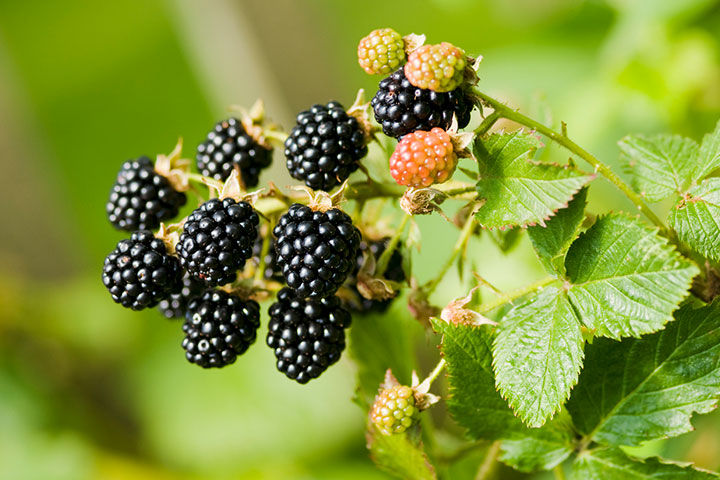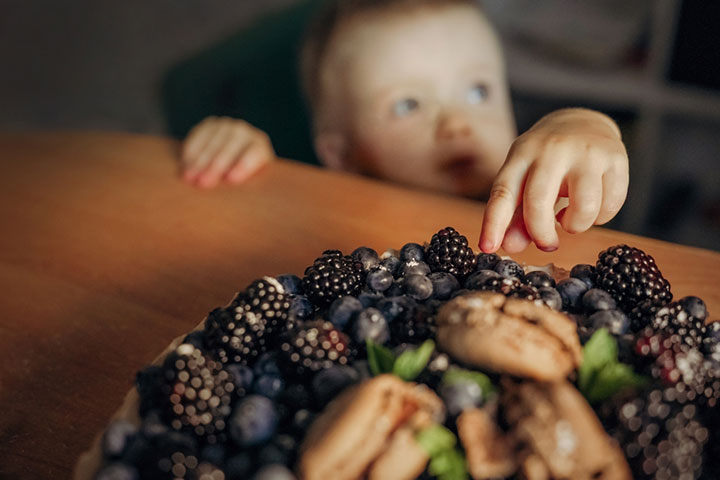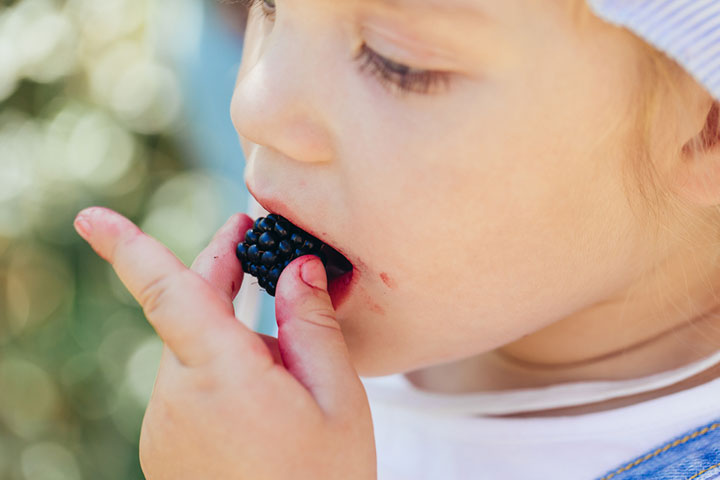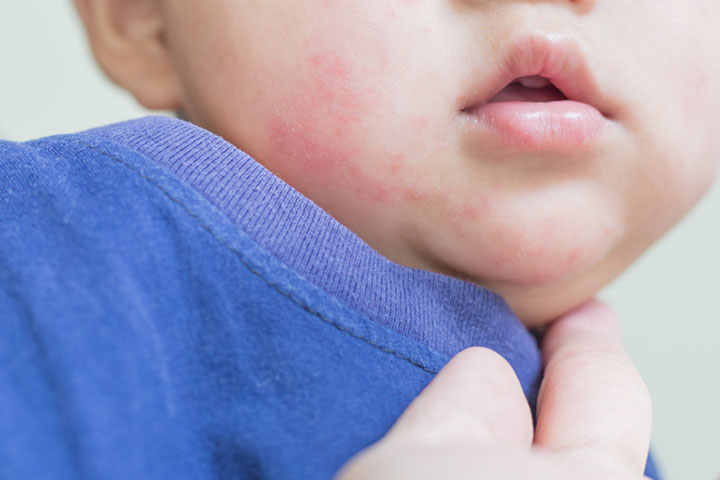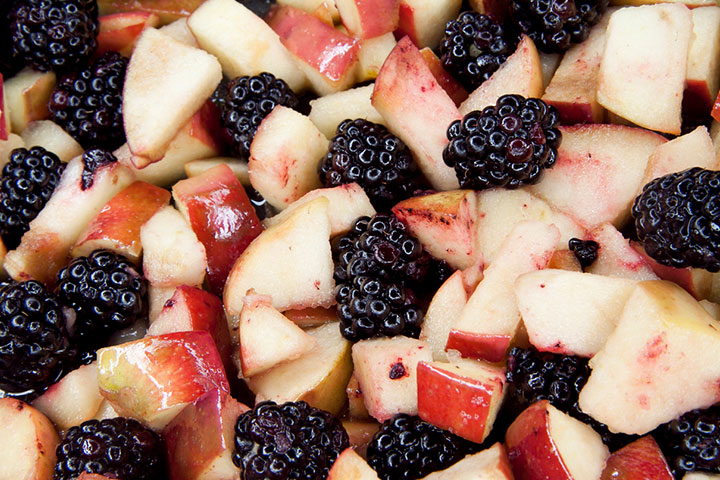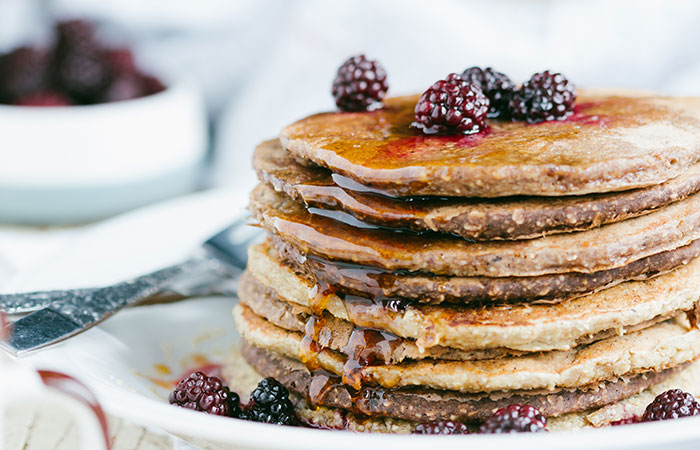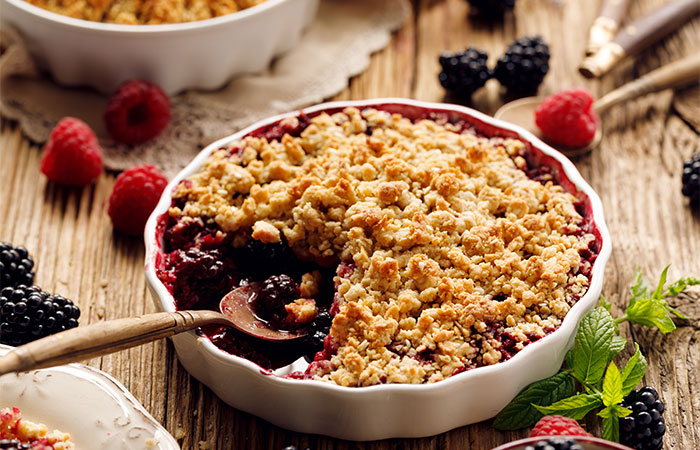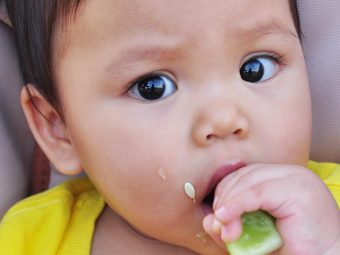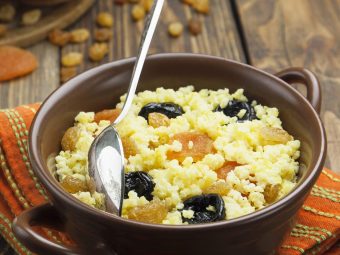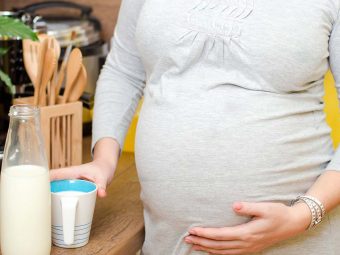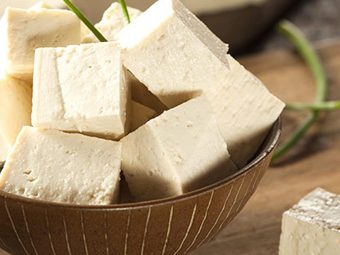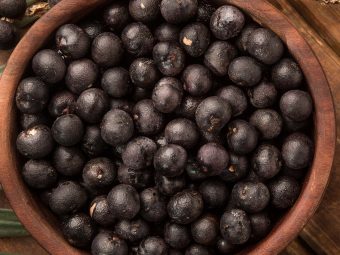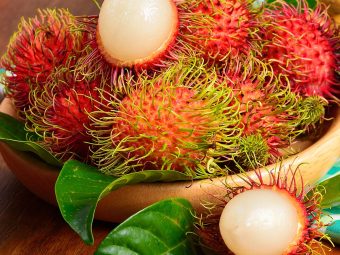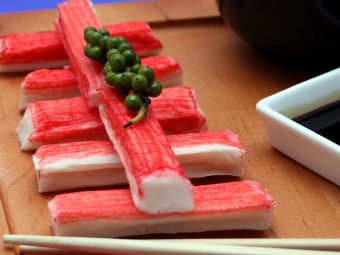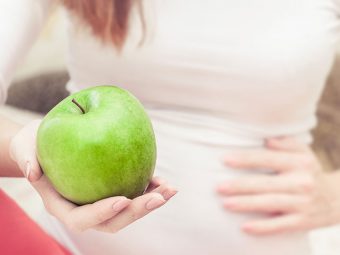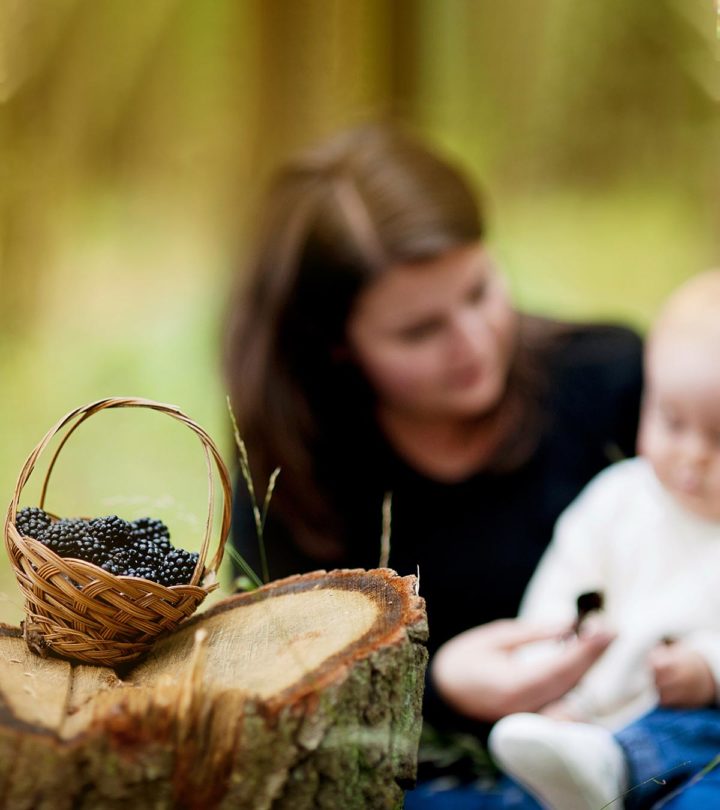
The benefits of blackberries for babies are numerous since it is a rich source of vitamin C and antioxidants. However, many parents do not include them in their baby’s diet because they fear it could be a choking hazard or cause food allergies.
Most pediatricians suggest introducing babies to blackberries after they have learned to chew properly. In most cases, these fruits do not cause any allergies; however, if you are worried, it is best to consult your child’s doctor.
Read this post to obtain some relevant information on blackberries and understand whether they are safe for babies or not.
About Blackberries
The soft and delicate blackberry mostly grows on trailing vines and thorny bushes. Blackberries usually grow as drupelets (a cluster of fruits), quite like a bunch of grapes. The seeds inside the drupelets possess high nutritional value. Minerals, vitamins, dietary fibers and antioxidants are just some of the nutrients in blackberries. The anthocyaninsiXDeep red, blue, and purple pigments found in plants offer the glossy and dark coloration to blackberries. The powerful phytochemicalsiXBioactive compounds found in plant-based foods that act as antioxidants and have antimicrobial effects in blackberries also protect your baby from diseases like dementiaiXA collection of symptoms that are so severe as to impair memory, problem-solving, language, and thinking process significantly and Alzheimer’s disease (1).
When Can My Baby Eat Blackberries?
Image: IStock
As soon as your baby begins to wean and have solid food, you can gradually introduce blackberries into their daily diet. Usually, the best time to include blackberry in your child’s diet is when she’s around four to six months old. At that age, you can start including solid foods and pureed berries as part of the baby-weaning diet. Remember that you need to blend it well and strain, so that your baby can swallow it easily.
However, if your baby suffers from a food allergy or chronic eczema, consult the pediatrician before including blackberries in her diet (2).
Goodness of Blackberries For Babies
Image: Shutterstock
A half cup serving of blackberries supplies almost 7 mg of Vitamin C, 0.03 mg of riboflavin, 0.03 mg of thiamine, and 2 gm of dietary fiber. Blackberries keep your baby’s digestive tract clean and enhance her skin health. The anti-oxidants present in blackberries minimize the risk of cancer. The high fiber content in blackberries regulates your baby’s bowel movement and reduces the risk of constipation or indigestion. The mineral calcium and magnesium present in blackberry helps in the healthy bone development of your little one.
 Quick fact
Quick factHealth Benefits Of Blackberries
Here are some of the noticeable benefits of blackberries for your baby (3) (4):
1. Antioxidant Properties:
Some of the antioxidants present in blackberries include flavonoidsiXA group of naturally-occurring antioxidant and anti-inflammatory compounds found in plants and fruits , phenolic acidsiXCompounds in plants that have antioxidant and anti-inflammatory effects on humans , and flavonols. This antioxidant-rich fruit protects your baby’s body from harmful oxidative damage.
The anti-oxidants rich fruit protects your baby’s body from harmful oxidative damage.
2. Prevents Cancer:
This nutritious fruit for infants reduces the risk of colon, lung, and esophageal cancers.
Blackberries contain micronutrients, which minimize the proliferation of malignant cells in your baby’s body.
3. Improves Digestive Health:
Blackberries serve as a rich source of soluble and insoluble fibers, which promote the optimum functioning of your baby’s digestive system. Dietary fibers in blackberries add bulk to your baby’s stool and promote regular bowel movements.
Dietary fibers in blackberries add bulk to your baby’ stool and promote regular bowel movements.
4. Cures Anemia:
As per the World Health Organization, the prevalence of anemia among children aged six to 59 months is 60.2%. However, there is a possible remedy in the form of blackberry fruit and juice, which aid in treating iron-deficiency anemia by increasing the body’s iron absorption.
5. Immunity Booster:
The healthy plant vitamins and minerals help your baby’s body fight against infectious diseases and germs.
Image: IStock
Recommendations
The American Academy of Pediatrics suggests that breastfeeding should be the sole source of infant nutrition for a newborn. When your baby reaches the age of six months, you can slowly introduce age-appropriate foods to her menu. As babies prefer sweet flavors, the introduction of blackberries never gives a sweet tooth to your little one.
Allergy Risks
Image: Shutterstock
Though berries rarely cause food allergies in infants, researchers conclude that it is best to include blackberries after your baby begins to consume traditional solid foods such as baby cereal, boiled vegetables, and pureed meat. Consult your medical practitioner, if your baby:
- Has severe to moderate eczema and has to undergo a medical skin treatment plan.
- Was previously diagnosed with any food allergies
- Had an immediate allergic reaction after eating certain foods
Some common signs of food allergy include skin rash, vomiting, diarrhea, wheezing, facial swelling, and abdominal cramp. If you notice any of the signs, after your baby eats blackberries, contact the medical consultant immediately.
Other Reactions
The recommended dosage of blackberry for your six-month-old baby is around 1–2 cups in pureed form. However, excess intake of blackberries can lead to some adverse conditions like:
- Nausea
- Stomach Upset
- Dark color of urine
How To Serve Blackberries To Babies?
Once your little one reaches the age of six months, and she can safely eat homemade baby food, you can serve her pureed form of blackberries. For babies above eight months, you can also consider offering fingertip-sized pieces of blackberries (2).
Can My Baby Have Blackberry Puree?
You can include blackberry fruit puree in your baby’s diet, whose age lies around six months. When you prepare homemade blackberry puree for a baby, it should not contain solid pieces. As your baby cannot chew their food properly, it is better to feed them the pureed form of the berry. Remove all the seeds, as it can elevate your baby’s risk of choking when they find it difficult to swallow them.
 Quick tip
Quick tipBlackberry Recipes For Babies
1. Blackberry And Apple Puree:
Image: IStock
You Will Need:
- 1 cup organic blackberries
- 2 organic apples chopped into small pieces
- 1/2 cup water or formula milk
How To:
- Take a medium-sized saucepan and add the said quantity of water or formula milk and boil it over medium heat.
- Add the pieces of apples and blackberries into a steamer basket and let them soften for ten minutes.
- Let the boiled water cool down.
- Transfer the steamed apples and blackberries into a food blender or processor, to obtain a smooth puree.
- Add ¼ cup of boiled water to the puree, until it reaches your desirable consistency.
- Feed the fresh apple and blackberry puree to your baby.
 Quick tip
Quick tip2. Blackberry Pancake (above six months):
Image: Shutterstock
You Will Need:
- ½ cup flour
- ½ cup milk
- 1 egg
- ¼ cup blackberries
How To:
- Add an egg to the flour.
- Pour in the milk, and mix until all items are just combined (avoid overmixing).
- Allow the batter to rest for three minutes. Adjust consistency by adding water if needed.
- Gently fold in the blackberries.
- Heat a pan and spoon a dollop of batter onto it.
- Cook for three minutes until the top stops bubbling.
- Flip and cook the other side for another three minutes.
- You may serve plain or top it up with some blackberry syrup or chopped blackberries.
3. Blackberry Baked Oatmeal (above 12 months):
Image: Shutterstock
You Will Need:
- 2 ¾ cups rolled oats
- 1tsp cinnamon
- 2 cups milk
- 2 eggs, beaten
- ¼ cup maple syrup
- 3tbsp melted butter
- 1 ½ cups frozen blackberries
How To:
- Set the oven to preheat at 350˚F and spread a small amount of oil on the baking tin.
- In a bowl, combine oats and cinnamon.
- Stir in milk, beaten eggs, maple syrup, melted butter, and blackberries.
- Pour the mixture into the baking tin and bake until the top is firm (30-35 minutes).
- Remove, let it cool, cut into slices and serve.
Frequently Asked Questions
1. Are blackberries good for baby constipation?
Blackberries are fiber-rich and help prevent constipation in babies and toddlers. However, you may give them in moderate amounts as they cause gas and bloating, making it difficult for your little one to digest them in excess (5).
2. Can blackberries make baby poop black?
Blackberries and blueberries can be a reason for your baby to have black poop or black specks. It may occur if blackberries are consumed in larger quantities or if it is the main ingredient in a diet throughout the day (6).
3. Are blackberries a high allergy food?
Blackberries have low allergenicity. Some babies can have an allergy to blackberries. However, blackberry allergy is rare compared to other baby food sources. This can also be due to consuming lesser amounts of berries (7).
4. At what age can babies eat berries?
Babies can eat berries around seven to eight months when they are already eating solids, including other baby-friendly fruits and vegetables. You may cut spherical berries into small pieces and remove seeds and stems before giving them to the baby to prevent the risk of choking (8).
5. Can blackberries cause diarrhea?
Blackberries are prone to mold due to their short shelf life. Consuming contaminated or moldy blackberries may cause diarrhea (10). Sensitivity to salicylate, a naturally occurring chemical in blackberries, can sometimes cause diarrhea and allergies in infants (3). Blackberry, a high FODMAP fruit, can cause indigestion in people with IBS (Irritable Bowel Syndrome) (11).
6. Do blackberries have a laxative effect?
Berries, in general, are rich in fiber and help soften stool. Therefore, consuming a handful of blackberries every day may help ease constipation (12).
7. Which is healthier: blackberries or blueberries?
Blackberries for babies could be a healthful addition to their weaning diet. This fiber-, antioxidant-, and vitamin-rich berry alleviates digestive troubles and is recommended for enhancing digestive health in babies after six months. You may begin feeding blackberries in mashed forms after removing the seeds. You may cut the fruit to your fingertip size for babies older than eight to nine months and serve them. Try adding other baby-friendly fruits, such as apples, to enhance the nutritional value of blackberry puree further. Contact a pediatrician immediately if you spot any signs of allergies in your baby after consuming blackberries.
Infographic: Goodness Of Blackberries For Babies
Blackberries can be a nutritious and tasty addition to a baby’s diet. Nevertheless, it’s vital to choose ripe, soft fruits and introduce them gradually in the pureed form to avoid choking hazards and aid in reaping their maximum health benefits. The following infographic highlights some potential health benefits of blackberries for infants. Illustration: Momjunction Design Team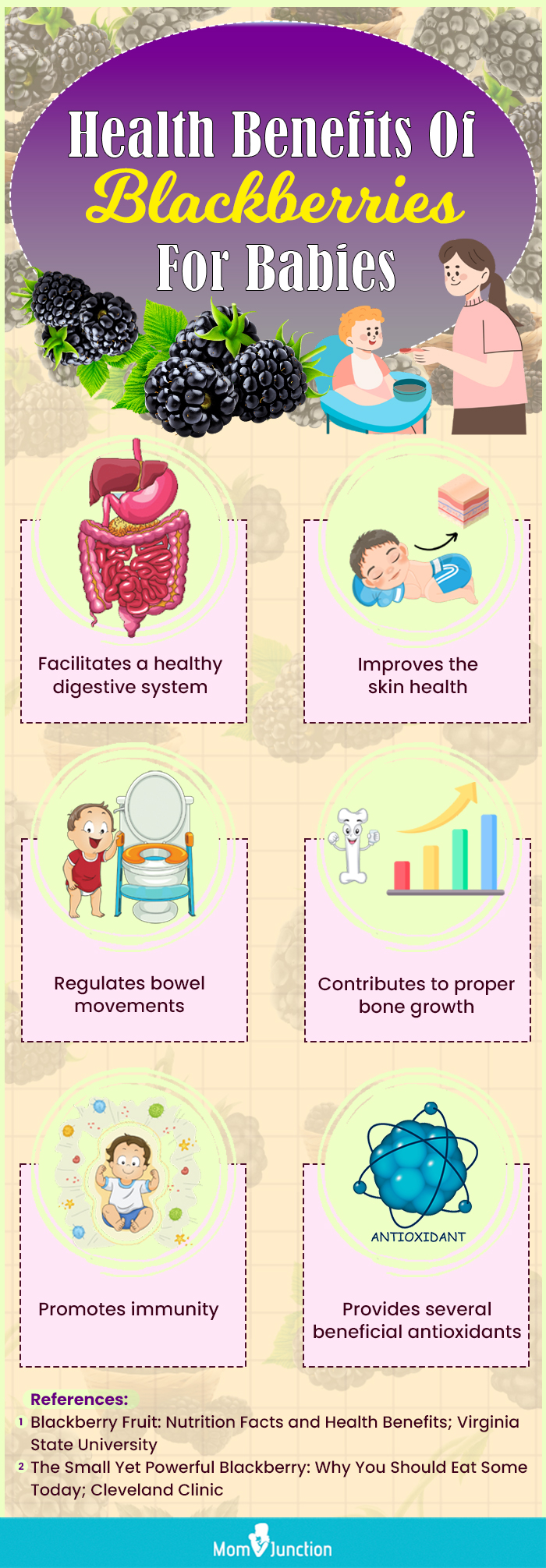
Key Pointers
- Blackberries are rich in antioxidants and vitamins and could be introduced to babies at around six months.
- Begin by feeding them a blackberry puree. Then, if it suits them, you may add it along with other fruits to make an interesting recipe.
- These calcium- and fiber-rich berries help reduce constipation and aid in bone development in babies.

Image: Stable Diffusion/MomJunction Design Team
Blackberry is a tasty fruit that can be incorporated into baby foods. Learn how to make a Quinoa Blackberry Banana Avocado baby puree that’s perfect for babies 6 months and up.
References
- Neuroprotective effects of berry fruits on neurodegenerative diseases.
https://www.ncbi.nlm.nih.gov/pmc/articles/PMC4192974/ - Can I Give My Baby Blackberries?
https://sleepbaby.org/feeding-baby-blackberries/ - Rubus fruticosus (blackberry) use as an herbal medicine
https://www.ncbi.nlm.nih.gov/pmc/articles/PMC4127818/ - Berries: Bursting With Health Benefits.
https://badgut.org/information-centre/health-nutrition/berries-bursting-with-health-benefits/ - Blackberry Fruit: Nutrition Facts and Health Benefits.
https://www.pubs.ext.vt.edu/content/dam/pubs_ext_vt_edu/spes/spes-366/SPES-366P.pdf - Black, Green or Bloody: What’s Up With My Poop?.
https://www.dietvsdisease.org/poop-stool-color/ - Blackberry Allergy Test.
https://foodallergytest.co.uk/product/blackberry-allergy-test/ - When, What, and How to Introduce Solid Foods.
https://www.cdc.gov/nutrition/infantandtoddlernutrition/foods-and-drinks/when-to-introduce-solid-foods.html - Blackberry Fruit: Nutrition Facts and Health Benefits.
https://www.pubs.ext.vt.edu/content/dam/pubs_ext_vt_edu/spes/spes-366/SPES-366P.pdf - What Happens if You Accidentally Eat Moldy Food?
https://health.clevelandclinic.org/what-happens-if-you-eat-moldy-food/ - Low FODMAP Fruits: A List of What You Can and Cannot Eat
https://www.dietvsdisease.org/low-fodmap-fruit-list/ - Natural laxatives that work fast
https://www.nourishdoc.com/health/natural-laxatives-that-work-fast - Blackberries, raw
https://fdc.nal.usda.gov/fdc-app.html#/food-details/173946/nutrients - Javier Marhuenda et al.; (2016); Phenolic Composition, Antioxidant Activity, and In Vitro Availability of Four Different Berries
https://www.hindawi.com/journals/jchem/2016/5194901/ - Huma Bader Ul Ain et al.; Phytochemical profile and pro-healthy properties of berries
https://www.tandfonline.com/doi/full/10.1080/10942912.2022.2096062





